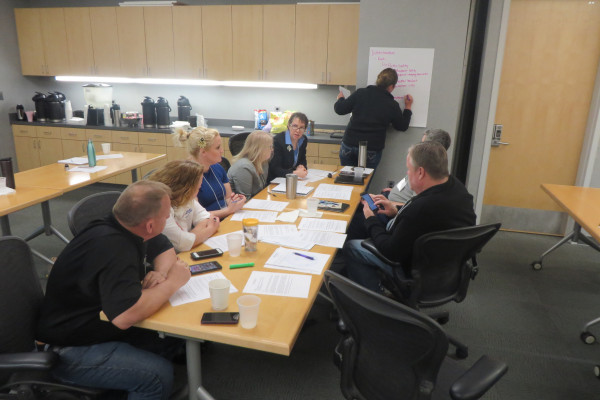The Simple Planning Tool for Climate Hazards has been transformed from four individual PDFs to a fully online interface. This 2.0 version is still tailored to each of the four SCIPP states of Arkansas, Louisiana, Oklahoma, and Texas. This interactive online interface includes both expandable menu items throughout the page and a side menu that allow users to access the content quickly and easily. SCIPP can also update the tool in a more timely manner and more easily add content as we learn of new stakeholder needs.

Climate-Informed Planning
To address continued gaps in uninformed communities, SCIPP will make continued strides in collaborating with planners, emergency managers, water utility personnel and aquaculture producers. We will partner with them to effectively incorporate climate information into their plans to help build long-term resilience, and study planning processes to identify issues such as inclusion and dissemination.
Simple Planning Tool for Climate Hazards v2.0 (Online Version)
Incorporating Climate-Informed Planning into Species Best Practices
The goal of this research is to quantify favorable locations for oyster aquaculture along the Texas and Louisiana coasts, then determine if those suitable locations are projected to change given climate change.
Expansion of the Simple Planning Tool for Climate Hazards to Texas and Louisiana
SCIPP developed the PDF versions of the Simple Planning Tool for Texas and Louisiana Climate Hazards. These tools were patterned off the Oklahoma and Arkansas versions that were developed a few years ago. Since completing the Texas and Louisiana PDF versions, a new online format has been developed. Visit the Tools page under the Resources tab on this website for the latest version.
Climate Adaptation and Capacity-Building in Communities
The research objectives of this project include:
- Assess how cities in the SCIPP region are including community voices within their climate adaptation planning.
- Understand how community groups experience climate change impacts, and the extent that these experiences reflect the ways cities conceptualize climate adaptation.
- Develop ways to improve climate adaptation planning.
This project will assess what climate adaptation activities are already happening and how communities are integrated in these planning activities (or how they could be). We will work with community partners to create resources for community planning and monitoring of federal resources and opportunities and engage with communities to co-produce knowledge on climate risk and vulnerability.
* This project was included in a prior theme under previous award conditions.
Building Capacity for Hazard Mitigation Planning in Low-Capacity Communities
A significant portion of SCIPP’s work over the last decade has focused on how climate and hazard information can inform planning and practices. Progress has been made, but hazard mitigation planning is still lacking in the region. Several reasons for why this is the case have been identified. This project is working to address one of those reasons, which is the need to develop a hazard mitigation planning template that is useful for low-capacity communities and broadly advances climate resilience and disaster risk reduction. The project will also shed light on other reasons and identify solutions that can be used to reduce barriers.
Through a collaboration with the National Hazard Mitigation Association and FEMA Region VI, this project is addressing several research questions. The first two questions are primarily being answered through literature review. The second two are being answered by collecting data through focus groups. The research questions are as follows:
- Why are most low-capacity communities unable to address their existing hazard-related challenges?
- What additional capacities and capabilities are needed so that low-capacity communities can address their hazard challenges that are being/will be exacerbated by climate change?
- How should a hazard mitigation planning template be designed so it: a) better aligns with the capabilities and capacities of low-capacity communities and b) advances climate resilience and disaster risk reduction more broadly rather than only meeting a FEMA Hazard Mitigation Plan requirement?
- What hazard mitigation planning capability and capacity gaps exist that could be addressed by the NHMA Disaster Risk Reduction Ambassador Curriculum and other applicable training curriculums?
To date, 31 local planners, emergency managers, town managers, consultants and related practitioners working in or with low-capacity jurisdictions across the region are involved in the study. Three rounds of focus groups have been conducted. Research is ongoing and an additional round of focus groups is planned for later this year.
For more details, including preliminary results, see this webinar recording that was hosted by the Natural Hazards Center as part of their Making Mitigation Work webinar series.
Developing Community Resources for Climate Resilience
This project involves working with a local nonprofit in Louisiana to create community resources for:
- Navigating disaster assistance programs.
- Exploring housing and small business recovery programs.
- Surveying the intersection of climate hazards with industrial hazards and pollution.
* This project was included in a prior theme under previous award conditions.
